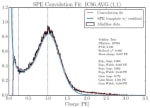For South Pole experiments like the IceCube Neutrino Observatory, all instruments—whether in the ice or on the surface—must undergo feasibility studies to make sure they can operate in the harsh Antarctic conditions. Optical instruments, especially, are subject to icing and snow accumulation. Recently, the IceCube Collaboration proved the successful operation of a new instrument, an imaging air-Cherenkov telescope, at the Pole. They outline the details of the study in a paper published today in the Journal of Instrumentation. […]
Optimizing the “eyeballs” of the IceCube Neutrino Observatory
Researchers in the IceCube Collaboration are always looking for ways to improve the understanding of the PMTs so they can get the highest-quality data from the DOMs. Most recently, they implemented a new method for more accurately characterizing individual PMT charge distributions, which was shown to improve PMT calibration and simulation. The method is described in a technical report submitted today to the Journal of Instrumentation. […]
Week 3 at the Pole
Last week the IceCube team completed their planned upgrades for the radio and scintillator arrays. Here we see an antenna that got deployed on the ice. […]
Week 2 at the Pole
Although summer is coming to an end, it’s not over yet. Planes are still flying to and from the Pole—here we see two twin otters in the air. […]
Off the ice: a Q&A with our 2018-19 winterovers, Kathrin and Benjamin
Our winterovers for the 2018-2019 season, Kathrin Mallot and Benjamin Eberhardt, returned from Antarctica last November. Now that they’ve had a couple of months to relax and readjust to life “up north,” we asked them to reflect upon their recent experience at the South Pole. Read our Q&A to find out what they missed the most, what they learned while they were there, and other things they shared about their adventure. […]
Week 1 at the Pole
Ah, penguins! Who doesn’t love them? Both of IceCube’s winterovers got to view and photograph penguins recently, but not at the South Pole—no animals can survive the extreme cold temperatures of the Pole. […]
Week 52 at the Pole
Life at the South Pole is full of traditions. And as one year ends and another begins, anticipation always mounts for a special tradition: the unveiling of the new South Pole marker. […]
IceCube performs the first-ever search for neutrinos from the sun’s atmosphere
The IceCube Collaboration recently performed the first-ever experimental search for solar atmospheric neutrinos. Such a detection would have important implications for understanding solar magnetic fields and how cosmic rays propagate in the inner solar system, and it could even provide additional background to solar dark matter searches. But after investigating seven years of IceCube data, IceCube researchers did not detect any solar atmospheric neutrinos and so set an upper limit on the flux. Their results are outlined in a paper that was recently submitted to the Journal of Cosmology and Astroparticle Physics. […]
ANTARES and IceCube combine forces to search for southern sky neutrino sources
The IceCube Collaboration recently conducted a combined IceCube-ANTARES search for neutrino point-like and extended sources in the southern sky. They didn’t find any significant evidence for cosmic neutrino sources, but the analysis shows the strong potential for combining data sets from both experiments. Their results were submitted to The Astrophysical Journal. […]
Week 51 at the Pole
The last full week of 2019 was a busy one at the South Pole. Yes, there were the holiday festivities (and a group photo!), but plenty of work was going on as well. […]









